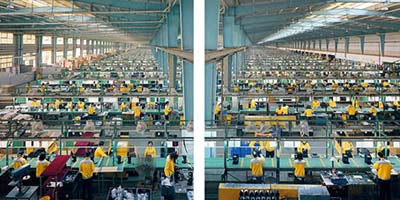A key question in this responsibility debate is whether emissions should be allocated to the firms that generate them in production or to those who ultimately consume the goods in which the emissions are embodied.
Recent research has found that around one third of Chinese CO2 emissions can be traced to exports, compared with 12 per cent in 1987 and 21 per cent in 2002. And while China clearly imports goods that generate emissions elsewhere as well, according to one estimate, the emissions embodied in exports exceed those avoided by imports by over 1 billion tonnes – a figure close to three times Australia’s total emissions.
China’s National Development and Reform Commission argues that China should not be solely responsible for reducing these emissions, particularly if doing so would come at the expense of economic development.
Considering that China’s per capita emissions rank around 70th in the world, compared with Australia’s first place ranking, and that the average Chinese person’s per capita income is just one-tenth of the average Australian’s – a point that is often forgotten as we are dazzled by the bright city lights of Shanghai and Beijing, this argument seems fairly reasonable.
This is not to say that China should keep on emitting in an unconstrained fashion – and recent policy shifts indicate that they have no intention of doing so. Rather it suggests that we, as the relatively rich and high-emitting consumers of cheap Chinese goods, might consider it reasonable to share some of the costs of reducing Chinese emissions. An alternative to this would be to purchase fewer plasma TVs and to go without air-conditioning, although lower consumption seems to be an option that few Australians consider viable.
Of course, foreign trade and investment are not solely responsible for China’s emissions and China needs to reduce the carbon intensity of all of its goods, not just its exports.
Reducing the heavy reliance on coal is fundamental to this immense domestic challenge, requiring the installation of more renewable power and overcoming financial and technological challenges involved with adopting new technologies, like carbon capture and sequestration.
But surely this challenge would be made easier with foreign cooperation on, for example, low- carbon research and development, finance provision, technology alternative transfer and trade openness.
This may just enable emissions reductions and economic growth to occur hand-in-hand, with obvious benefits for all.
The principle of ‘common but differentiated’ responsibilities essentially recognises the different capabilities of developed and developing countries with regard to tackling climate change. In the lead-up to Copenhagen, China was asking developed countries to give careful consideration to this principle, while emphasising the need for developing countries to take ‘appropriate action’ in light of their own national situation. President Hu Jintao has recently promised to reduce the carbon intensity of the Chinese economy by 40-45 percent by 2020 compared with 2005 and China’s fiscal stimulus package has already included measures to invest in emission-reducing structural change and cleaner technologies.
Who’s responsible for the emissions generated on Chinese soil?
Hu’s responsible, but he’s not alone. As a developed country, Australia should be aiming beyond China’s efforts by making our own commitment to emission reductions credible and binding and by supporting an international agreement, whether it is reached in Copenhagen or not.
Furthermore, specific measures to assist China in meeting its commitments would signal a cooperative approach to solving a shared problem and would be beneficial to our bilateral relationship in the process.
This article first appeared in the Canberra Times on 07 December 2009

